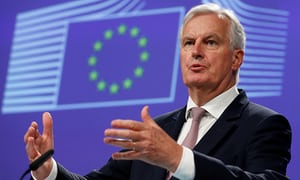Jul 17: The majority of Brexit supporters would be happy to swap European free movement for single market access, according to two studies which suggest ways for Britain to pull back from the brink in the upcoming negotiations.

Amid calls for the government to loosen its opposition to free movement in order to protect the economy when Britain leaves the EU, the research shows compromise would result in far less popular backlash than is assumed. Campaigners opposing hard Brexit claim it also vindicates their new slogan “no Brexit is better than a bad Brexit”.
In a poll conducted by YouGov three weeks after the general election, 1,600 adults were asked how important they thought it was to reduce immigration from the EU.
Framed as an isolated issue, the study confirmed that public opinion is still deeply divided a year on from the Brexit referendum: 72% of leave voters rated immigration either as very important or the most important issue in the talks, and 74% of remain voters said the opposite, ranking it less important or not important at all.
When asked to consider free movement as a trade-off for single market access – a principle described last week as “indivisible” by EU’s chief Brexit negotiator Michel Barnier – British voters appear far more pragmatic and united.
Leave voters would be evenly split if the government tried to keep full access to the single market in exchange for allowing a version of free movement that limited welfare benefits for new arrivals. Across the country as a whole, twice as many voters would be satisfied with this option than not, even though it goes no further than the deal struck by David Cameron before the referendum.
But support for a trade-off soars when voters are offered the option of other limitations on free movement that are used by some countries in the single market. Asked to consider a system where EU migrants were sent home if they did not find work, 55% of leave voters said they would be satisfied with this, versus only 25% who would be unhappy. There was only slightly less support for an “emergency brake” option to control surges in immigration.
Best For Britain, a pressure group opposed to hard Brexit that commissioned the research, said it proved it was wrong to assume that the referendum result meant Britain wished to ban free movement whatever the cost.
“Our polling shows that a huge majority of people across the country support freedom of movement if they too can keep their own rights to live, work and study abroad,” said its chief executive, Eloise Todd. “The picture is much more nuanced than the government has portrayed, with clear support for some limitations on freedom of movement that are already within the government’s control.”
The reputation of opinion polling has suffered since the surprises of the referendum and June’s general election, but YouGov’s conclusion is supported by other methods of assessing the public mood.
A separate study by researchers at King’s College London, the Rand thinktank and Cambridge University used a technique called “stated preference discrete choice experiments” to ask people to weight different priorities.
It found very little appetite for the government’s “no deal is better than a bad deal” approach to the talks, and voters much keener to compromise.
“Our research is one of the most rigorous assessments to date of what the public wants from Brexit, and it clearly shows that the British people do not wish to head over a cliff edge and leave the EU on World Trade Organisation rules – they want a proper deal,” said Jonathan Grant, the professor of public policy at King’s College London. “The British public are sophisticated enough to understand that they can’t ‘have their cake and eat it’, and will need to make and accept compromises to reach a deal.”
The team found that supposed red lines on immigration and leaving the European court of justice were far less important to voters than the government.
“While our results do show a desire to control movement of people to some extent, we find that this stems from a concern about managing demand for public services, rather than from wanting to limit freedom of movement per se,” wrote the team led by Charlene Rohr of Rand.
“Our analysis indicated that, on average, respondents would prefer a future relationship in which the UK is able to make and interpret all laws itself, but this was considered less important than maintaining free trade or being able to negotiate new trade deals independently.”
The new picture of public opinion comes as polls show overall support for Brexit dipping sharply as talks deteriorate, leading some campaigners to argue that the government must now invert its “no deal is better than a bad deal” slogan.
“It’s increasingly clear that no Brexit is better than a bad Brexit: no one voted to become poorer or have their rights reduced,” said Todd. “The government has committed to delivering the ‘exact same benefits’ out of Brexit for the UK and its people – that means guaranteeing citizens’ rights as they stand, and right now the government is failing on that measure by its own standards.”
Options for a softer Brexit
Efta membership Perhaps the most radical, but obvious, solution to Britain’s Brexit wobble would be to seek some form of membership of the European Free Trade Association, which the UK was in between 1960 and 1972. First designed as a stepping stone toward EU membership, this prosperous club comprising Norway, Iceland, Switzerland and Liechtenstein could serve the same role this time in reverse – at least until Britain was clearer on its final destination. At a bare minimum it could give the UK access to an internal market of four nearby economies, as well as a host of existing global trade deals. Joining just Efta would require freedom of movement but only among its four, relatively small, members.
“It could provide an elegant and relatively swift solution to some of the challenges facing the UK in securing post-Brexit trade agreements with non-EU partners,” concludes a new London School of Economics research. “The combination of continuity and flexibility could prove very valuable as the UK navigates the numerous uncertainties of the Brexit process”
Far more contentious would be using Efta to access the European Economic Area (EEA) and the wider single market of the EU, as Norway does. This is the option that gives Brexiters nightmares as it involves accepting EU rules on freedom of movement, regulation and payments, with little corresponding influence. But if this is the price of single market access either way, Efta at least provides a framework.
A customs union A less onerous alternative to the EEA might be to seek more limited access to European goods markets by striking a new customs deal with the EU, as Turkey has done. Not to be confused with the EU’s own internal customs union, which is reserved for members, this would guarantee the tariff-free frictionless trade sought by Tories and Labour, but (possibly) without all the burdens of full single market participation.
A customs union would undoubtedly come with a cost, especially in terms of Britain’s freedom to strike new international trade deals. However, recent Treasury research suggests the benefits of continued access for manufacturing supply chains far outweigh the unproven allure of far-flung new export markets. Proponents of this approach also point out that Liam Fox’s international trade department might still be able to seek new deals in the service sector instead, where Britain’s economic future looks brighter.
Associate status It is far from clear that either the Norway or Turkish models would automatically be on offer to post-Brexit Britain, but even more wishful thinking is apparent in another idea proposed by some Tories. They would like to see Britain seek associate membership of key regulatory agencies, such as Euratom and the European Medicines Agency, as a way to soften the blow of leaving the EU sector by sector.
At the very least this is likely to involve abandoning Theresa May’s opposition to the jurisdiction of the European court of justice. Ongoing associate membership would also come at a financial cost that would swell the size of Britain’s giant divorce bill. But the cost of replicating decades of accumulated bureaucracy from scratch without any international cooperation may well prove even higher.
No Brexit Vince Cable and Tony Blair have both recently predicted that Brexit may yet be abandoned entirely. As far-fetched as this might seem now, if Britain chooses the softer Brexit routes above, then it would have to accept most of the political compromises of EU membership anyway. A few years of pressing our face to the glass like Norway may be just what it takes to change Britain’s mind.







Comments
Add new comment